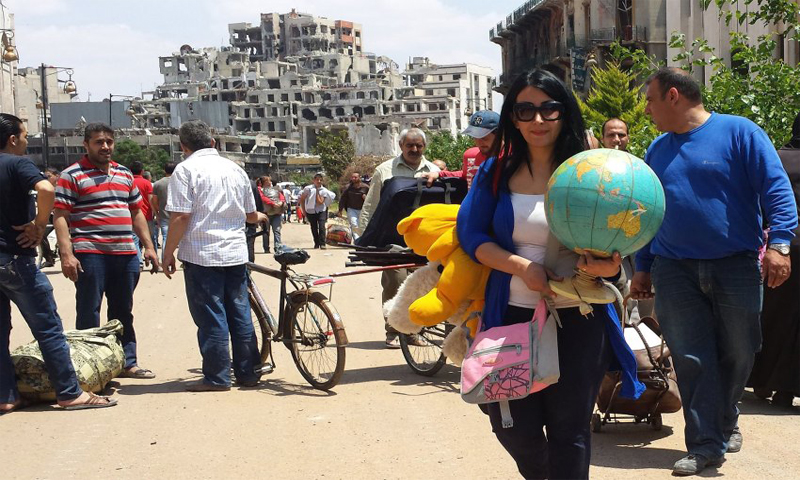The Syrian regime’s plan to affix the term “morally nihilistic terrorists” in the minds of the people in the city of Homs has not succeeded — a term it used for the Free Syrian Army in the city at the time — in contrast to the acts and behaviors of its loyalist class, ahead of what even mafias have done in foreign countries.
The exit of fighters from the city in 2014 was not sufficient to return security to Homs. Instances of kidnapping, killing and theft are dominant today in its loyalist districts, feeding a phenomenon which frightens its supporters.
Civilians in the districts under regime control in Homs describe these instances and phenomena of moral decay in light of its submission to the authority of militias supporting Assad forces, which have become impossible to stop.
A Daily Series of Theft and Looting
Cases of theft, criminal acts, and harassment have spread in the city of Homs, and have begun to be publicized in Assad loyalist pages over social media alongside calls for the “state” to intervene to deal with the issue.
Nariman, a 30-year-old living in the Al-Inshaat district of Homs (she asked her full name not be published for security reasons) said that such incidents were not common before the outbreak of the Syrian revolution and the mobilization in the city. “We didn’t expect that things would reach the level they have. We’ve started to see crimes and theft in the city more than we used to see them on TV. Over the last few days, a gold jeweler was kidnapped and robbed. The crimes have come to include anyone who has money in the city.”
The cases of theft and looting began with the start of the revolutionary mobilization in Homs at the hands of army fighters at checkpoints and security branches, who still carry out such actions until today, according to Nariman. She continued that, “Most residents of Homs city have had money, bags or mobile phones stolen at security checkpoints. It’s impossible to debate or ask for the reason they use to justify this act, because the soldier is armed to the teeth and could easily haul you off to an unknown location.”
The “decay” is not just limited to cases of theft and robbery. Indeed, it has spread to include school students, who spend most of their time outside school in billiards halls, public parks and the city’s streets, alongside an unprecedented appearance of drugs among the youth, especially students of preparatory and secondary school. The dealers for these drugs roam the streets under the view of security officials.
Nariman said, “The cases of students skipping school have spread widely. We’ve started to see cases of romantic relationships among students spreading in the gardens and streets. This goes back to the inability of school staff to get control of the students and get them in line, especially given that some of the students belong to families with ties to the security apparatus. This makes it impossible to threaten them or punish them. Anytime the student is the son or relative of an official, he gets more attention than regular students and he’s allowed to skip school, smoke, be absent, throw insults, hit people, or deal drugs.”
Demands and Accusations Against the Regime Government
Media activist Abou al-Walid, from Homs, said that, “The Syrian regime today is unable to stop its shabeeha (loyalist militia), who wreak havoc at every moment as loyalists call for strict measures against the ‘mdaoomeen’ (beneficiaries), knowing that the regime has not been able to control them, especially after the spread of drugs in the hands of its leaders and fighters and the complete loss of control over the shabeeha of Al-Kharam al-Tahtani and Al-Qarietain, who cut off roads and issue threats if drug dealers and their arrested relatives are not released.”
The neglect of the regime toward the life of its loyalists through the issuance of a number of decisions which are mostly considered to benefit the wealthy areas at the expense of the poor has sparked anger. The activist said that, “loyalists today believe that [the regime] is indifferent to their lives, security and comfort, which has sparked a great deal of anger,” citing the widespread criticism that followed the issuance of the transport directorate’s decision to move the buses of the western area and Masyaf to the wealthier northern garages, which are no longer safe because they are uninhabited.
The Decay Began with the Absence of “State Authority”
The decay and its beginnings stemmed from an ignorance of religion and the absence of role models, as well as the absence of monitoring and accountability, starting with the disappearance of “state authority” and power, and ending with many parents being busy fighting on one of Syria’s fronts — alongside television programs broadcast on state channels, which have met criticism recently for emphasizing drug-dealing among youth and the spread of clubs and nights out.
This article was translated and edited by The Syrian Observer. Responsibility for the information and views set out in this article lies entirely with the author.


